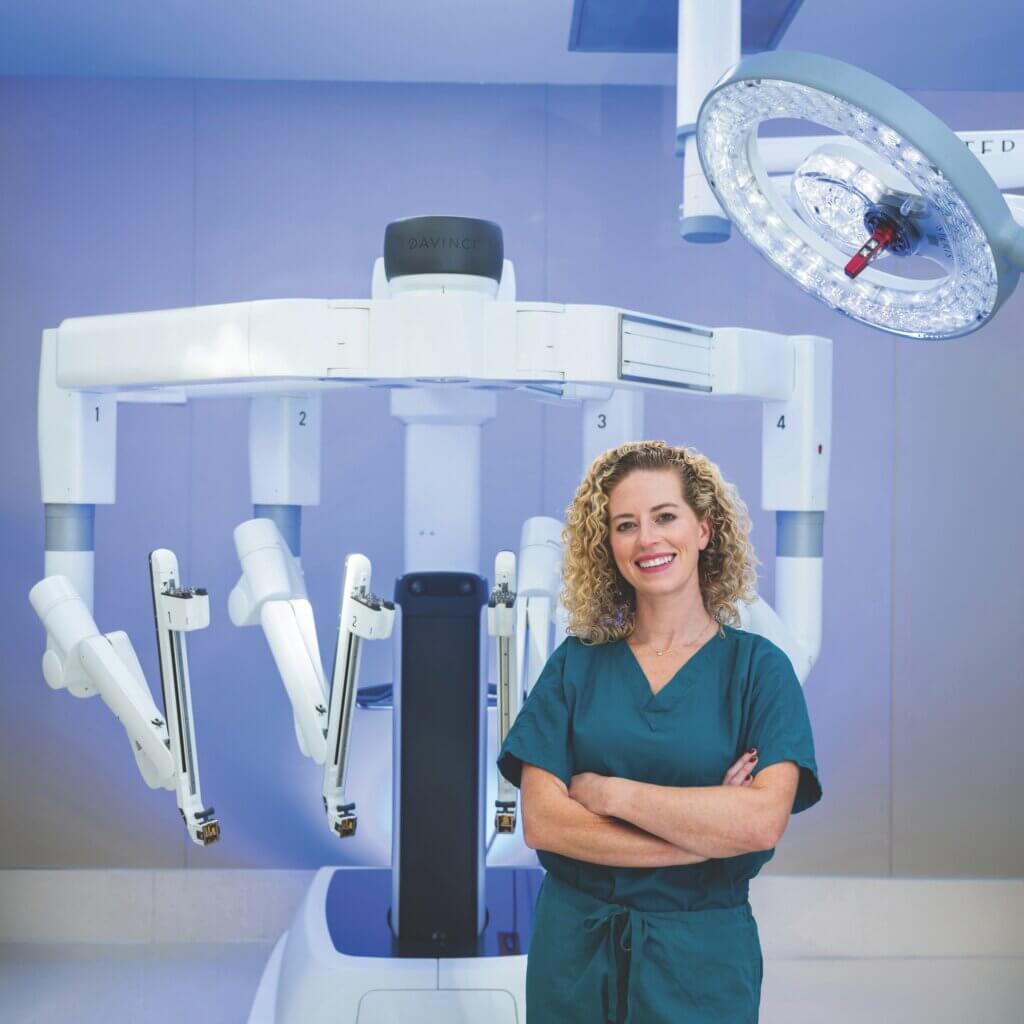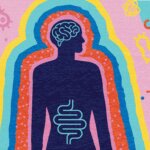Mind & Body
The Gut-Health Connection
Believe it or not, much of your vibrant mountain lifestyle is powered by the amazing system inside your gut.
“Your digestive system does much more than process your morning coffee or evening meal,” explains Alexandra Kovar, MD, gastrointestinal surgeon at Aspen Valley Health (AVH). “It’s linked to your immune system, energy levels, mood and even how long you live. Your gut health is the hidden engine that powers everything you do.”
Recent research backs this up. A major 2024 study in Nature Medicine found that gut bacteria can predict endurance and recovery time with 83% accuracy. This matters for those of us who love Roaring Fork Valley’s active lifestyle.
Table of Contents
- Beyond Digestion: Your Gut as Mission Control
- Positive Daily Habits Make a Difference
- Why Preventive Gut Care Matters
- Advanced Care Helps Address Common Conditions
- Debunking Gut Health Myths
- Innovations in GI Health
- Your Path to Optimal Gut Health
- Common GI Conditions Explained
- Connect with Our Gut Health Experts
Beyond Digestion: Your Gut as Mission Control
“Gut health” means more than digestion. It refers to how well your entire gastrointestinal (GI) system works—from esophagus to intestines—and the trillions of helpful bacteria living there. These bacteria, called your microbiome, work day and night to keep you well.
“Your microbiome is like the town square of your body,” Dr. Kovar explains. “When it’s healthy and diverse, it boosts immunity, helps control weight, lifts moods and reduces inflammation.” When your gut balance is off, it can lead to problems like obesity, diabetes, autoimmune diseases and even anxiety or depression. This makes gut health essential to your overall wellbeing.
Dr. Kovar joined AVH in 2024 after completing special training at Stanford University. She brings top-notch expertise in gastrointestinal health to our valley. “I was drawn to Aspen because people here value healthy living,” says Dr. Kovar. “It’s the perfect place to practice medicine that focuses on quality of life and longevity.”
She uses gentle surgical approaches and advanced robotic methods to treat acid reflux disease (GERD), obesity and digestive cancers. Her goal is to help patients heal faster and flourish.
Positive Daily Habits Make a Difference

Creating intestinal health starts with diet—especially foods rich in fiber that feed beneficial bacteria.
“Fiber is your gut’s best friend,” Dr. Kovar emphasizes. “Vegetables, fruits, beans and whole grains fuel your good gut bacteria while keeping you regular and possibly lowering colon cancer risk.”
Current guidelines from the American Gastroenterological Association (updated in early 2024) suggest 25-30 grams of fiber daily for adults. Most Americans eat less than half that amount, which leads to more digestive problems nationwide.
Drinking enough water is just as important.
“Water helps fiber do its job and prevents constipation,” notes Dr. Kovar. “For active Aspen residents exercising at altitude, staying hydrated is even more crucial for digestive health.”
“Your gut health is the hidden engine that powers everything you do.” -Alexandra Kovar, MD | Gastrointestinal and minimally invasive robotic surgery specialist at Aspen Valley Health
Mindful eating habits also boost digestion. Taking smaller bites, chewing well and eating slowly—instead of rushing meals between activities—greatly improves how your body absorbs nutrients.
“When patients tell me about digestive discomfort, I first ask about their eating habits,” Dr. Kovar shares. “Rushing meals or eating right before bed disrupts your digestive rhythm, often causing discomfort, reflux and poor nutrient absorption.”
Regular activity, something most locals naturally include in their routines, helps digestive health by promoting movement in the intestine and reducing stress. Research published in the Journal of Applied Physiology in 2024 found that even moderate exercise can increase gut bacteria diversity by up to 30 percent over six months.

Quick Tips for Everyday Gut Health
Fiber-Forward Eating
Aim for 25-30 grams of fiber daily from diverse sources:
- Add berries to your morning routine
- Include a handful of nuts or seeds as a snack
- Choose whole grains over refined options
- Make vegetables the star of your plate, not just a side dish
- Gradually increase fiber intake to avoid digestive discomfort
Hydration Habits
- Drink at least 64 ounces of water daily—more when exercising or at altitude
- Start each morning with a glass of water
- Carry a reusable water bottle during activities
- Limit alcohol and caffeine, which can be dehydrating and irritate the digestive tract
- Monitor urine color: pale yellow indicates good hydration
Mindful Meals
- Take 20 to 30 minutes for meals, instead of eating on the go
- Put down utensils between bites
- Chew each mouthful 20 to 30 times
- Avoid eating within three hours of bedtime
- Create a pleasant, stress-free environment for meals
Stress Management
- Practice daily stress reduction through outdoor activities, meditation or deep breathing
- Consider yoga, which combines movement with breathing techniques beneficial for digestion
- Prioritize adequate sleep (7 to 9 hours) to support gut health
- Connect with community—social interaction benefits both mental and gut health
Medication Awareness
- Use antibiotics only when necessary—they kill beneficial gut bacteria along with harmful ones
- Minimize use of NSAIDs (ibuprofen, naproxen) when possible, as they can irritate the digestive tract
- If taking medications regularly, ask your doctor about potential gut health impacts
- Consider probiotics during and after antibiotic treatment (consult your healthcare provider first)
Preventive Screening
- Schedule your first colonoscopy at age 45 (earlier with family history)
- Don’t ignore persistent digestive symptoms—early intervention typically means simpler treatment
- Discuss digestive health at your annual physical
- Remember that many effective gut-protective behaviors (fiber, hydration, exercise) also support cardiovascular health and longevity
Why Preventive Gut Care Matters
Perhaps most vital to GI health is preventive care, especially regular screenings like colonoscopies and endoscopies. These procedures aren’t just for diagnosis. They prevent serious illness by finding and removing potentially dangerous growths before they become cancerous.
“Many GI issues develop silently, with few or no early warning signs,” warns Dr. Kovar. “By the time symptoms show up, conditions may already be advanced. That’s why routine screenings are so crucial. They catch problems before they become serious.”
According to 2024 guidelines from the American Cancer Society, colonoscopies are now recommended for everyone starting at age 45, or earlier for people with family history or concerning symptoms. With colon cancer rates rising in younger adults, this preventive approach has never been more important.
“I often see patients who’ve delayed screenings because they feel healthy or their schedules are too busy,” Dr. Kovar notes. “But these procedures truly save lives. At AVH, we’ve created efficient protocols to make screenings as comfortable as possible, respecting your active life while protecting your long-term health.”
Advanced Care Helps Address Common Conditions

When digestive issues do arise, Dr. Kovar and her team at AVH offer leading-edge treatments, including simple surgical approaches for best outcomes.
Acid reflux disease (GERD) and Barrett’s esophagus are two of the most common conditions Dr. Kovar treats. GERD happens when stomach acid backs up into the esophagus, causing heartburn and potentially leading to Barrett’s esophagus, a precancerous condition.
“Early warning signs of GERD include persistent heartburn, trouble swallowing, nausea and unexplained weight loss,” explains Dr. Kovar. “Spotting these symptoms early and seeking prompt medical care prevents complications and greatly improves treatment results.”
For obesity, which is directly linked to digestive health, Dr. Kovar offers both surgical and non-surgical options. As one of the few surgeons in western Colorado with specialized fellowship training in weight-loss procedures, she brings advanced expertise to our mountain community.
“The link between obesity and gut health goes both ways,” she notes. “Excess weight raises risks for diabetes, heart disease, cancer and liver problems. At the same time, an imbalanced gut microbiome can contribute to weight gain. Today’s treatments are effective, minimally invasive and empowering—helping patients achieve lasting health improvements.”
“Today’s treatments are effective, minimally invasive and empowering—helping patients achieve lasting health improvements.” – Alexandra Kovar, MD
Dr. Kovar’s training at Stanford included certification in robotic surgical techniques using the da Vinci system. She now offers this leading-edge treatment to GI patients at AVH.
“This advanced technology helps patients recover faster with less pain,” she explains. “For our active community, this means getting back to the outdoor activities much sooner that make life here rewarding.”
Debunking Gut Health Myths
Despite growing awareness about digestive health, misconceptions still exist. Dr. Kovar regularly addresses several common myths with her patients.
One widespread belief holds that nuts, seeds and popcorn trigger diverticulitis (inflammation of pouches that form in the intestinal wall). “Science has completely disproven this myth,” Dr. Kovar states firmly. “These foods are actually good for your digestive health, providing valuable fiber and nutrients.”
Similarly, trends like colon cleansing performed outside medical supervision often cause more harm than good. “When done improperly, these treatments pose real risks including dehydration, infection or intestinal damage,”
Dr. Kovar cautions. “Always talk to a medical professional before trying alternative treatments.”
Regarding probiotics—supplements containing beneficial bacteria—Dr. Kovar takes a balanced approach. “Probiotics have shown effectiveness as added therapy for specific conditions like antibiotic-associated diarrhea, C. difficile infection and certain types of irritable bowel syndrome,” she explains. “However, they’re not cure-alls, and quality varies greatly between products.”
She recommends evidence-backed options like Align, Culturelle and Activia when appropriate, while emphasizing that probiotics work best when supported by a fiber-rich diet that naturally nourishes gut bacteria.
Innovations in GI Health
AVH continues investing in cutting-edge technologies that enhance digestive care for our community. Recent additions include advanced endoFLIP technology and high-resolution manometry for detailed esophageal function assessment, complementing our state-of-the-art surgical capabilities.
“We’ve also added AI technology to our colonoscopies,” Dr. Kovar adds enthusiastically. “This helps us find about 10% more polyps than colonoscopies done without this technology—a significant advantage in cancer prevention.”
Dr. Kovar envisions AVH becoming a regional center for comprehensive gastrointestinal and metabolic surgery.
“We already provide testing and surgeries that were previously only available in Denver or Grand Junction,” she notes. “I want our neighbors to have access to the same level of care without the added stress of travel. We know patients do better when they have support from their community and loved ones.”
Your Path to Optimal Gut Health

For residents of the Roaring Fork Valley seeking to enhance digestive wellness, Dr. Kovar offers five tips:
-
- Eat fiber-rich foods
- Stay hydrated
- Manage stress through regular exercise or mindfulness practices
- Limit processed and high-sugar foods
- Get recommended preventive screenings
“Every healthy choice you make for your gut,” Dr. Kovar emphasizes, “is a healthy choice for your life. At AVH, we’re committed to supporting your journey to wellness every step of the way.”
Get Connected with our Gut Health Experts
Common GI Conditions Explained
Gastroesophageal Reflux Disease (GERD): A chronic condition where stomach acid flows back into the esophagus, causing heartburn, regurgitation and potential damage to esophageal tissue. While lifestyle changes and medications help many patients, advanced cases may benefit from surgical procedures that strengthen the valve between the esophagus and stomach.
Barrett’s Esophagus: A serious complication of chronic GERD where normal esophageal tissue is replaced with tissue resembling intestinal lining. This precancerous condition affects up to 15% of GERD patients and requires regular monitoring. Research published in the American Journal of Gastroenterology (2024) found that early endoscopic intervention reduced cancer development by approximately 76% over a five-year follow-up period.
Irritable Bowel Syndrome (IBS): A common disorder affecting the large intestine, causing abdominal pain, bloating, gas, diarrhea and/or constipation. While IBS doesn’t damage the digestive tract, it significantly impacts quality of life. Management typically includes dietary changes, stress reduction and sometimes medication.
Inflammatory Bowel Disease (IBD): Includes conditions like Crohn’s disease and ulcerative colitis that cause chronic inflammation in the digestive tract. Symptoms include persistent diarrhea, abdominal pain, rectal bleeding, fatigue and weight loss. Treatment usually involves anti-inflammatory medications, immune system suppressors and occasionally surgery.
Diverticulitis: Occurs when small pouches (diverticula) that form in the digestive tract become inflamed or infected. Contrary to popular belief, seeds and nuts don’t cause flare-ups. Most cases respond to antibiotics and dietary adjustments, though severe or recurrent episodes may require surgical intervention.
Celiac Disease and Non-Celiac Gluten Sensitivity: Conditions triggered by consuming gluten, a protein found in wheat, barley and rye. Celiac disease is an autoimmune disorder causing damage to the small intestine, while non-celiac sensitivity produces similar symptoms without intestinal damage. Both require strict dietary management to prevent symptoms.





